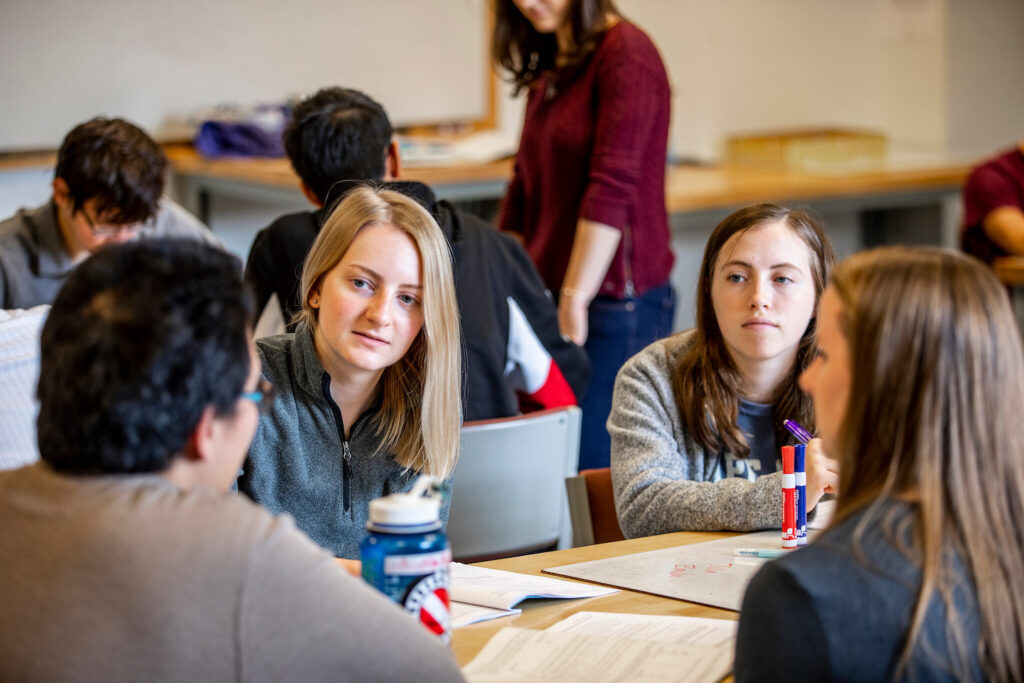A dizzying whirlwind of threats, from disinformation campaigns to hacking and tampering with voting data, could undermine elections both in the U.S. and internationally. Democracy falls apart once doubt creeps in about whether elections are conducted fairly and openly.
That’s why students in the University of Washington’s Information School are working with Microsoft on a project to restore voter confidence in the electoral system.
“It’s one thing to not vote, but it’s a totally different thing that, ‘I’m not going out to vote because in the end my vote is not going to count,’” said Irfan Haider, one of the students. “That’s a completely wrong mentality, right?”
Microsoft enlisted Haider and fellow students Ashish Anand, Remya Koshy and Vighnesh Misal on a project to test a piece of the company’s Defending Democracy Program, an effort to safeguard democratic institutions worldwide.
This is the Capstone project for the students, who are finishing their second year in the Early-Career Master of Science in Information Management program.
Microsoft launched its Defending Democracy Program in 2018 as good corporate citizenship; the company isn’t seeking a profit for its efforts. As part of the program, the company created what’s called ElectionGuard, a way for voters to detect any tampering or alteration of their votes.
Each voter is given a tab with a unique code when they cast a ballot. The voter can enter the code into a web portal to make sure the ballot was counted.
Microsoft Research’s senior cryptographer Josh Benaloh, who designed ElectionGuard, notes that there are more than 8,000 jurisdictions that run elections in the U.S., mostly at the county level.
“Asking Walla Walla County to defend against an attack from the Russian FSB (Federal Security Service) is just not a fair fight,” Benaloh said. “We have a responsibility to try to build up the defenses as much as we can, but we also have to acknowledge that it is possible to break in and tamper with things.
“ElectionGuard is not preventing an attack. It’s purely about detection.”
ElectionGuard is a free, open-source software toolkit that can be used by election offices. Microsoft wants independent, outside parties to write, run or download verification programs to confirm ElectionGuard’s accuracy.
“You don’t have to trust Microsoft. … You can check it for yourself,” Benaloh said.
Microsoft turned to the iSchool for help creating the first verification programs. Two teams volunteered; the master’s program students and a second team of undergraduates. The undergraduate Informatics students are Nicola Kalderash, Hansol Trap, Xiang Li and Ajay Qi.
The project intrigued the grad students, who learned about it during October’s Capstone Networking Night. In the past few years, they’ve witnessed the rise of populist movements worldwide coupled with lingering doubts about the legitimacy of some elections.
“This entire thing has created doubt in the minds of people whether the elections are rigged or not, or whether the person that I voted for actually got the vote or not,” Anand said. “We just felt that this would actually answer a lot of those questions.”
Koshy was born in India but was raised Dubai in what she describes as a benevolent monarchy. She didn’t really see democracy in action growing up, but she has developed an appreciation for the process.
“This was my clearest opportunity out of everything we saw at Capstone Night to be able … to say that I’ve contributed to something that I cared about,” she said.
The technical aspect of creating a verification program drew Misal to the project. He wanted to learn about the logic behind the cryptography used in the software.
“When you plug the incoming numbers into the equation, as long as they match, you know the ballot is correct,” Misal said. “If, say, somebody has tampered with the ballot and actually changed the vote of a single person out of a hundred people, it will give you an incorrect result.”
In working on the project, the students relied on their iSchool studies on cybersecurity, data science, user experience and ethics. They’ve also tapped the expertise of adviser and iSchool lecturer Philip Fawcett.
The team faced practical and logistical challenges. ElectionGuard’s first test run was in February in two precincts with 398 voters in Fulton, Wisconsin. (This was before the coronavirus was widespread in the U.S.)
So, the students needed to wait for weeks for the actual data. All four are also international students so they needed to familiarize themselves with Wisconsin election procedures. Like everyone else, they too had to adjust working through telephone and video calls with the pandemic.
Benaloh said the students asked “many, many questions” that are helping him fine-tune specifications for future groups to write verification programs.
For the students’ part, they wanted to work on something with the highest social impact. If ElectionGuard removes doubt from future elections, they will have done so.
“Once you feel that your vote is actually going to the right person, then you’re more motivated to (participate in an) election,” Anand said. “We don’t want people to lose the whole motivation towards democracy.”
View the MSIM students’ project poster and video. View the Informatics team’s project.
